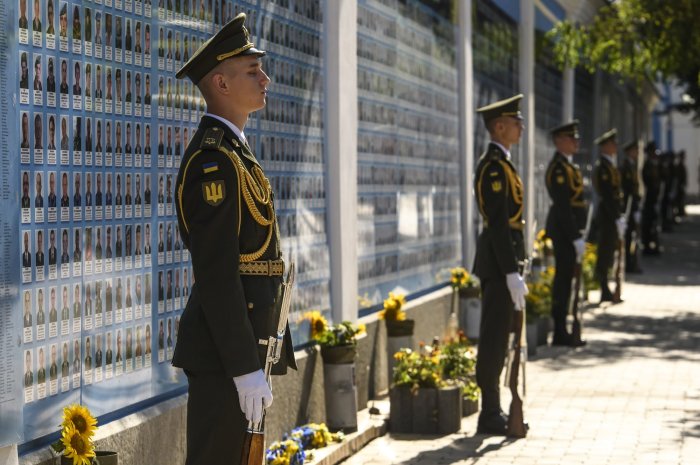A Ukrainian servicemen stands guard by the wall of memory to the fallen Ukrainian soldiers in Kyiv, Ukraine on Wednesday, August 24, 2022. This year, Ukraine's Independence Day, which commemorates their break with the Soviet Union in 1991, coincides with the six-month mark since Russia launched its large-scale invasion of the country. The fighting has largely focused on the eastern Donbas region and the south, but most anywhere in Ukraine remains vulnerable to Russian air strikes. Photo by Vladyslav Musiienko/UPI |
License Photo
Nov. 10 (UPI) -- The European Union announced Thursday that it will not accept Russian travel documents issued for regions of Ukraine that Moscow has claimed to have annexed.
The move, which also includes breakaway regions of Georgia and Crimea, comes after Russian President Vladimir Putin formally signed federal laws early last month to approve the annexation of the four Ukrainian regions of Donetsk, Luhansk, Zaporizhzhia and Kherson.
Democratic nations have voiced strong opposition to the annexation as an illegal land grab that followed Moscow holding referendums in the regions, which the ally countries have described as a sham.
The European Council has been negotiating a mandate to not accept Russian passports from the annexed regions of Ukrainian and from Georgia's Abkhazia and South Ossetia, which Russia recognized as independent in 2008, since at least the middle of last month.
"We will never recognize the violation of Ukraine and Georgia's fundamental rights to independence, sovereignty and territorial integrity," Vit Rakusan, minister of the interior of Czech Republic, said in a statement on Oct. 12 announcing the start of negotiations on the issue.
"The EU stands united and resolutely with both countries and their people."
Since Russia illegally annexed Crimea in March 2014, Moscow has issued Russian international passports to the peninsula's residents, with the practice extended to areas of Donetsk and Luhansk in April 2019 and Kherson and Zaporizhzhia in July, said EU officials who described the tactic as infringement of international law and Ukraine's territorial integrity, sovereignty and independence.
The EU said Thursday that these Russian travel documents will no longer be accepted as valid, barring people they were issued to from entering the Schengen zone of 26 European countries.
"This decision is a response to Russia's unprovoked and unjustified military aggression against Ukraine," it said in a statement.
Russian invaded Ukraine on Feb. 24, but after making strong early advances it has suffered a series of humiliating defeats, including in the regions it is claiming to annex.
Early this week, troops in Kherson city, the only regional capital Moscow captured, were ordered to withdrawal.
Zelensky during his nightly address Thursday said Ukrainian forces have liberated 41 Russian settlements amid the war.
"We have to go all the way -- on the battlefield and in our diplomacy -- for our flags, Ukrainian flags, and never again enemy tricolors to be hoisted on our entire land, along our entire internationally recognized border," he said. "It will be so."















